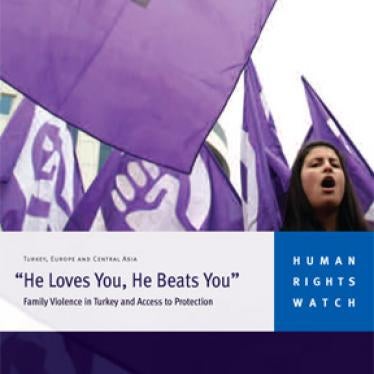(Istanbul) - European foreign affairs ministers gather this week in Istanbul to sign a ground-breaking new Council of Europe Convention on preventing and combating violence against women and domestic violence. The treaty, open to all 47 countries of the Council of Europe and also to non-member states, should improve domestic legislation by imposing civil and criminal measures to fight violence against women across Europe, Human Rights Watch said today.
"All European governments should sign and ratify the convention as soon as possible," said Gauri van Gulik, women's rights advocate and researcher at Human Rights Watch. "From women's rights groups in Armenia to lawyers in the United Kingdom, human rights defenders throughout the region can use this convention to protect women and fight for better laws and practices in their countries."
Some 20 to 25 percent of women across the European region suffer physical or sexual violence at some point in their lives, according to the explanatory memorandum accompanying the Convention.
The convention is the first legally binding instrument in the region that creates a comprehensive legal framework to combat violence against women through prevention, protection, prosecution, and victim support. It defines and criminalizes multiple forms of violence against women: physical, sexual and psychological violence, as well as forced marriage and female genital mutilation. The treaty also establishes an international group of independent experts to monitor its implementation at the national level.
The treaty is open for signatures at the ministerial meeting in Istanbul on Wednesday, May 11, after more than two years of negotiations.
"Practical in nature, this is a convention that has the potential to make a concrete contribution to the eradication of violence against women in Europe," said van Gulik, author of a new report on the topic in Turkey. "It addresses major gaps in protection of women and girls facing violence in the home."
To implement the convention, countries will establish hotlines, shelters, medical and forensic services, counseling, as well as legal aid. It addresses gaps in domestic violence legislation and implementation documented by Human Rights Watch and other organizations, such as weak laws, bad implementation of protection laws, lack of coordination, lack of access to justice, low funding for domestic violence responses, lack of shelters, and lack of prevention measures.
This poor track record on violence against women in many countries spurred the development of the convention. Human Rights Watch research demonstrates the need for the regional convention. Although laws to protect women from violence exist, they often exclude certain groups, like female asylum seekers or divorced women, and often laws are not translated into actual change on the ground.
On May 4, 2011, Human Rights Watch published a report on domestic violence in Turkey, "'He Loves You, He Beats You,' Family Violence in Turkey and Access to Protection." The report finds that in Turkey, gaps in the law and implementation failures by police, prosecutors, judges, and other officials make Turkey's family violence law and protection system unpredictable at best, and lethal at worst. In particular, it found that domestic violence victims seeking protection orders from family courts faced obstructive police officials, slow procedures, improper demands for evidence, and lax monitoring by law enforcement officers.
"Our research finds that even in countries where the law provides protection for women, those who enforce the law do not," said van Gulik. "That is why this convention asks leaders to sign up not just to principles but to actions."
In order for the convention to enter into force, at least 10 governments, including 8 member states of the Council of Europe, have to sign it. The European Union as a legal entity itself can also become a party to the Convention.







